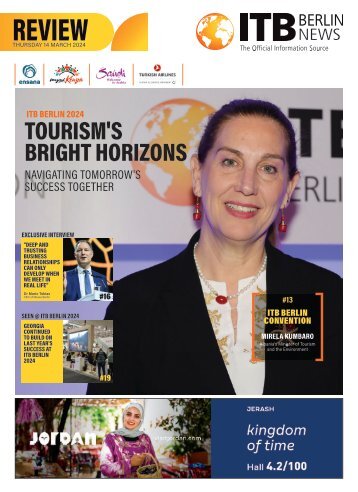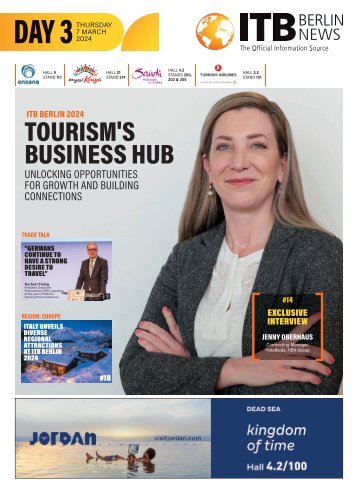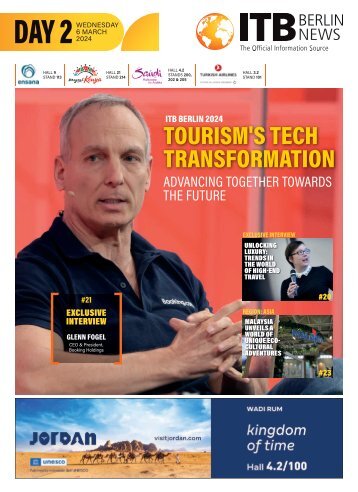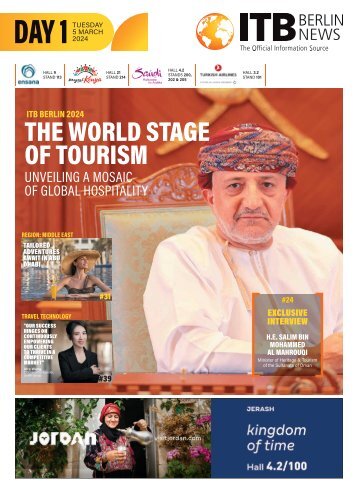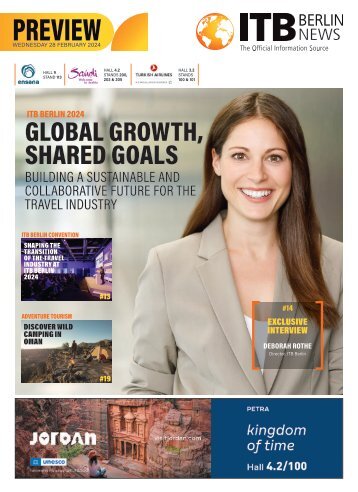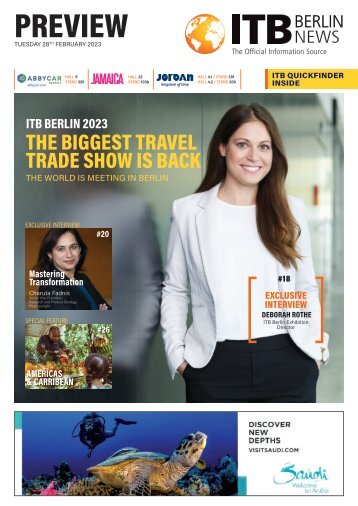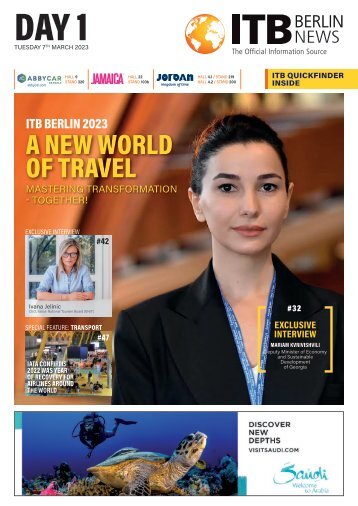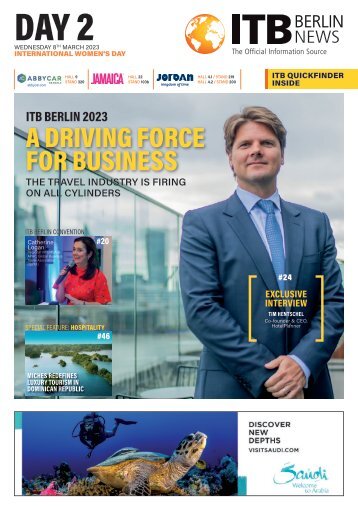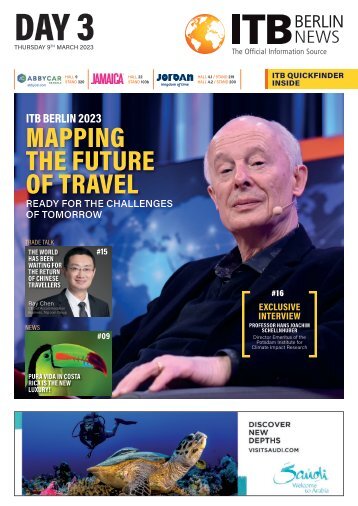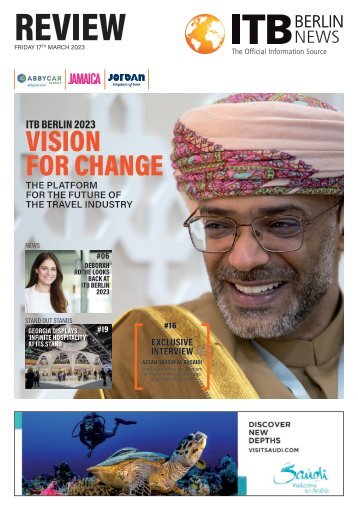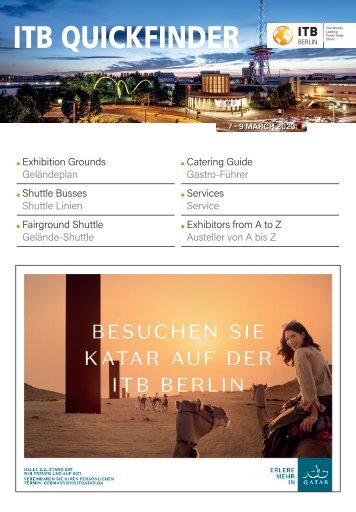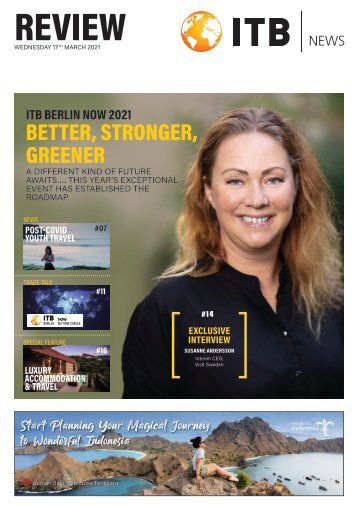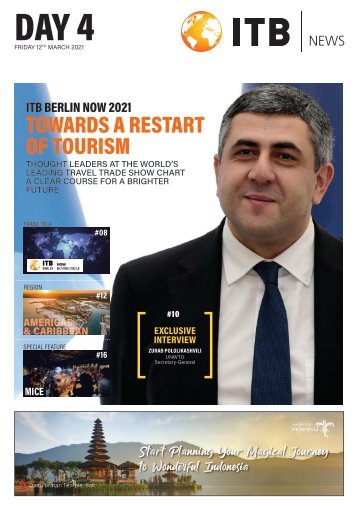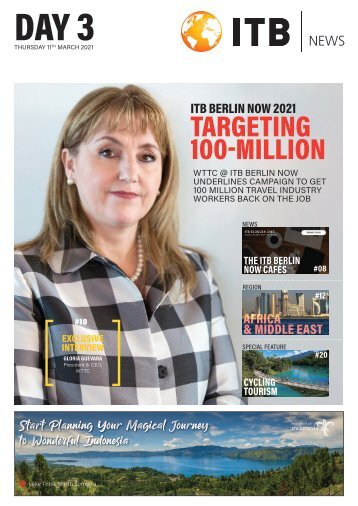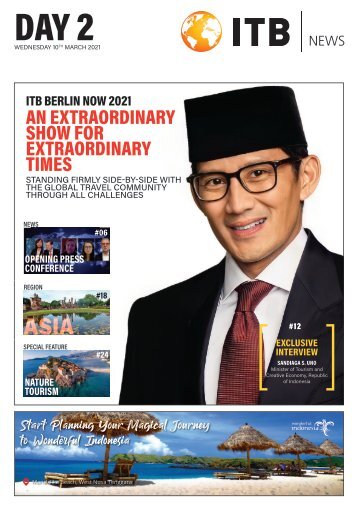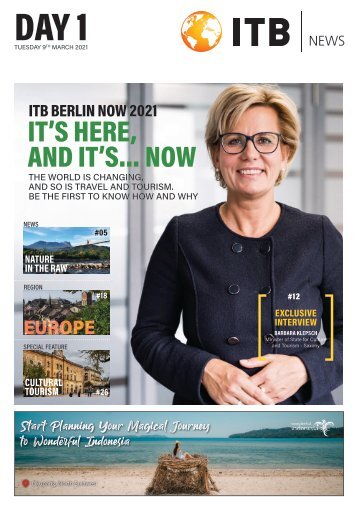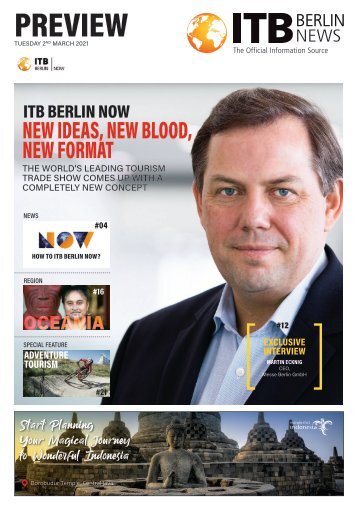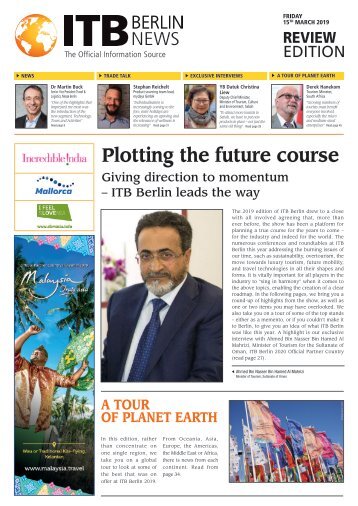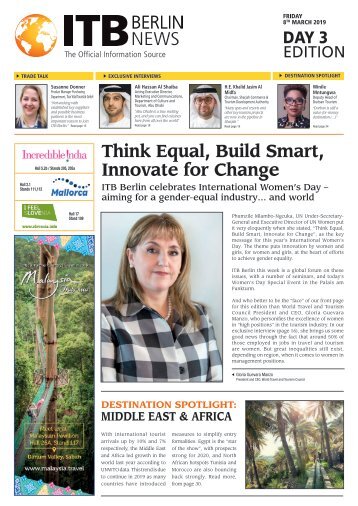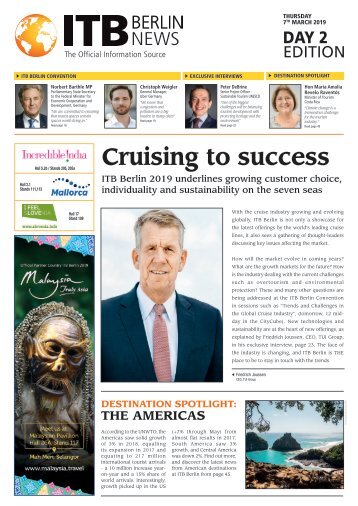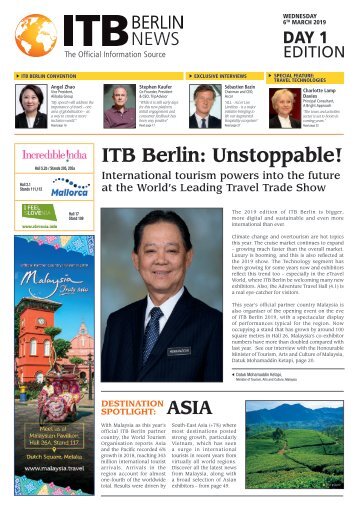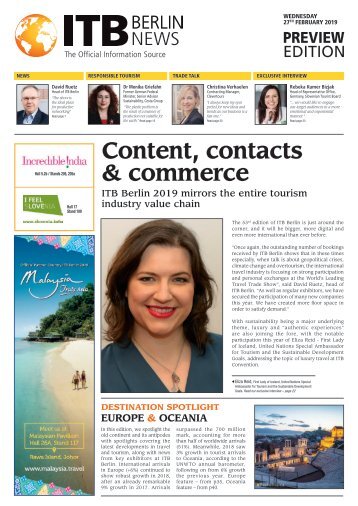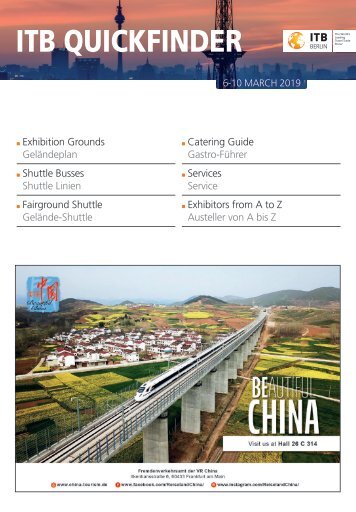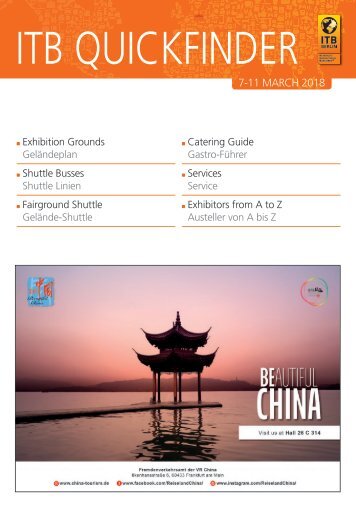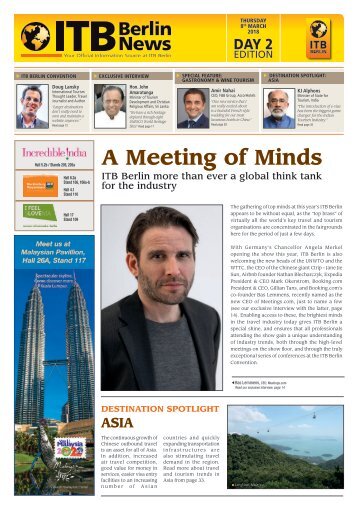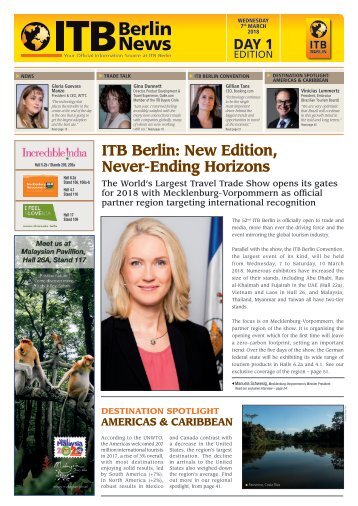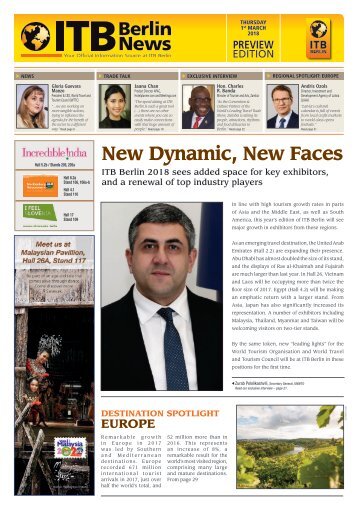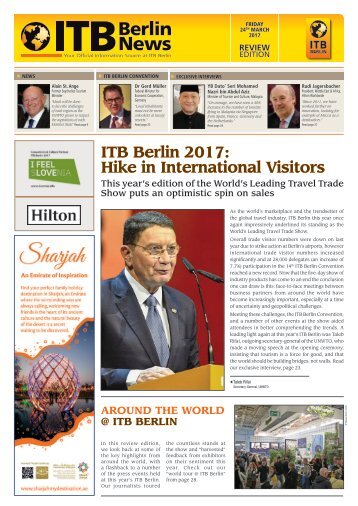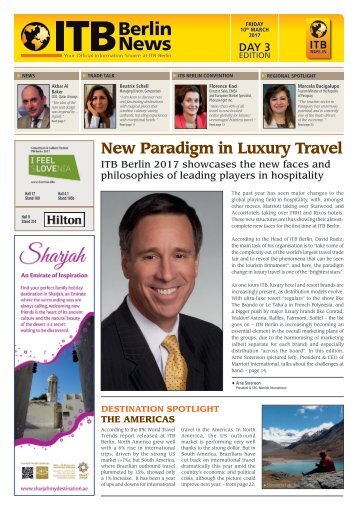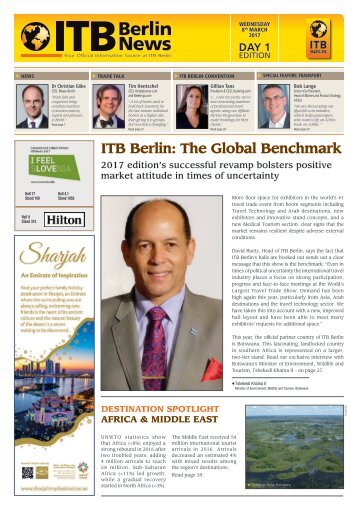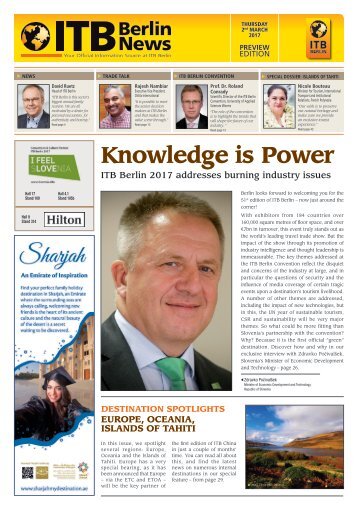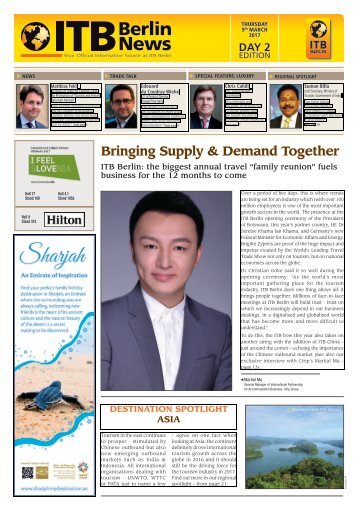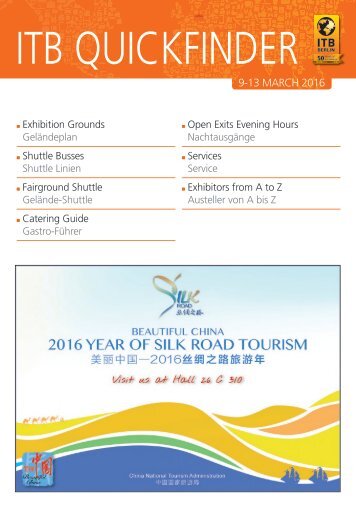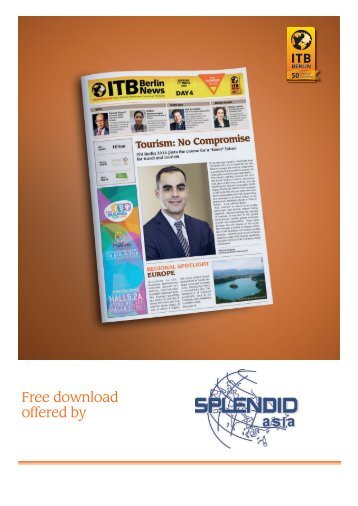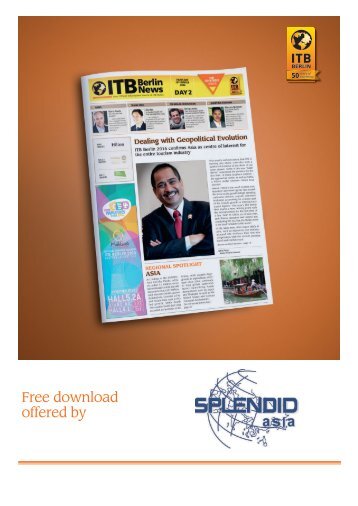
ITB Berlin News 2018 - Preview Edition
- Text
- Tourism
- Hotels
- Tours
- Resort
- Berlin
- Exhibitors
- Resorts
- Halle
- Tourismus
- Aussteller
- Www.cleverdis.com
16 ITB
16 ITB BERLIN CONVENTION Dr. David Ermen Senior Manager, Lodging and Tourism Clients Group, PwC Joel Brandon-Bravo Managing Director UK, Travelzoo FOCUS ON OVERCROWDED DESTINATIONS: MEASURES AND LESSONS LEARNED Category: Destination. Wellness Date: March 7, 2018 Time: 12pm – 12.45pm Location: Convention Hall 7.1a, Auditorium New York 3 THE REVOLUTION OF TRAVEL FROM THE CUSTOMERS’ PERSPECTIVE: AUTONOMOUS CARS AND FLYING TAXIS, HYPERLOOP AND SUPERSONIC JETS – EXCLUSIVE TRAVELZOO/ITB MARKET STUDY Category: Future, Marketing Date: March 7, 2018 Time: 3pm – 3.45pm Location: Convention Hall 7.1b, Auditorium London Learning The Overcrowded Lessons Talking About The Travel Revolution At this year’s ITB Berlin Convention, Dr. David Ermen, Senior Manager, Lodging and Tourism Clients Group at PwC, takes a closer look at the factors surrounding overcrowding and steps stakeholders can take to bring back sustainable levels. We asked him to tell us about the issue. Overcrowded destinations are those where the number of visitors exceed the carrying capacity of that particular location. This can be the ecological capacity, causing environmental damage, or social capacity, leading to objections from the local population. Most often these destinations are cities or attractions, rather than whole countries. Some of the most common examples are cities, like Amsterdam or Barcelona, and famous attractions, like Machu Picchu in Peru. In some cases the overcrowding is seasonal and not during the entire year, which also poses management challenges. What are the negative effects of overcrowded destinations? Overcrowding in destinations has negative impacts on the environment, the local culture and population, and also on tourists. At the same time, tourists themselves are affected, because they often also do not feel comfortable in overcrowded destinations. What are the recipes for success? One of the problems I see is that destinations still set their growth targets in terms of number of arrivals, rather than looking at the types of tourists they would like to attract and the positive impact they want to generate from these visitors. The hotel industry has worked with RevPAR, measuring revenue per available capacity unit, rather than only occupancy, for a long time. Destinations need to go the same way and start working with new success indicators that measure yield, rather than occupancy. How important is the ITB Berlin Convention when it comes to educating and informing the industry? I think the ITB Berlin convention is a great platform for dialogue and discussion between different industry players. The presentations and panels provide valuable insights into the state of the industry and future trends The revolution of travel will soon be reality: Fully-automatic, flying electric drone-taxis, hyperloop transportation and supersonic flight will make unprecedented forms of luxury travel possible. The study covers a lot of stuff that looks like science fiction. We asked Joel Brandon-Bravo, Managing Director UK, Travelzoo to tell us more… Supersonic planes, hyperloop trains, driverless cars – these are all exciting technologies that are in development today and have the potential to significantly disrupt the travel industry. Our survey has asked over 7,000 people worldwide what they think about these future modes of travel – their hopes, how likely are they to use them, and what they think the benefits will be to them and the planet. When will these technologies really be impacting travel and tourism? Driverless drone taxis are already being tested, as are facial recognition for payment and service robots in some hotels. Virgin Galactic hope to start commercial flights this year, and the Branson-backed team behind the Virgin Hyperloop One expect to have a commercial operation in service by 2021. Boom, a new supersonic airplane, aims to begin flights in 2023. What will be the biggest challenge in getting consumers to accept these new concepts? Our survey suggests that trust in the safety and environmental efficiency of the new technologies will be major barriers to acceptance. People will need to be convinced of its reliability, and reassured that there is a net gain to the planet through lower emissions. Our respondents have also expressed concerns over the likely costs for the new technologies. Who should come to your session at the ITB Berlin Convention and what will they come away with? Anyone with an interest in consumer attitudes about the transport and travel technology of the future should join us. We hope they’ll take away some useful and actionable insights from the planned end users of those technologies as they begin to think about how their own organisations adapt ITB BERLIN NEWS • Thursday 1 st March 2018 www.itb-berlin-news.com
ITB BERLIN CONVENTION 17 Bruce Poon Tip Founder, G Adventures Dr Alexander Tayler Chief Data Officer, Cambridge Analytica PURPOSE, HAPPINESS AND CONNECTION: GUARANTEES FOR PROFESSIONAL SUCCESS IN THE TOURISM INDUSTRY?! Category: Young Professionals Date: March 7, 2018 Time: 12pm – 12.45pm Location: Hall 11.1, Young Professionals Stage BIG DATA AND INTELLIGENT DATA ANALYSIS: THE DEATH OF TRADITIONAL ADVERTISING?! Category: Future, Marketing Date: March 8, 2018 Time: 3pm – 3.45pm Location: Convention Hall 7.1b, Auditorium London Preparing For Professional Success Analysing Big Data and Intelligent Data Bruce Poon Tip, Founder of G Adventures, says that happiness is the best way to boost performance. We asked him about his company and how he works to get the best from employees. We like to say G Adventures is more than just a travel company. We are the leader in terms of small group adventure trips around the world. We take travellers to more than 100 countries on all seven continents and have eight different travel styles including sailing and rail trips and local living trips, which are communitybased tourism where you can stay with an Amazon tribe for a week. With your talk based around professional success, please can you explain how to get the best from employees? I believe that happiness drives successful companies. If people are happy at work, they will go the extra mile. Creating a great company culture is also crucial to success; when you build a business that’s an industry leader, people want to be a part of it. I love what I do and that’s contagious. How do you inspire people in your own business? I encourage my team to find what inspires them, and it can’t just be work – you have to find things outside of work that inspire you, like art, wine, or travel. Have those creative moments, and bring that back to the workspace refreshed. I was lucky to discover my passion for travel at a very young age. As a young immigrant, moving to Canada had a big cultural impact on me and as child reading encyclopaedias and copies of National Geographic kept me interested in the world. I want my people to know their motivation. Who should come to your talk? Anyone who is interested in learning about finding passion and happiness working in travel – or even outside of travel… so everyone! Whether you’re a student in the travel industry, the founder of a start-up, or a leader of a large organisation At this year’s ITB Berlin Convention, Dr Alexander Tayler, Chief Data Officer, Cambridge Analytica, will talk on how Big Data and Artificial Intelligence are turning the advertising world upside down. We asked him how big data and Artificial Intelligence will impact on the travel and hospitality sector… Data is already transforming the industry. Booking platforms, for example, have a wealth of data on travellers and undertake very sophisticated performance marketing. Other organisations such as airlines, hotels and attractions are benefiting hugely by using data to inform their operations. The sector is targeting travellers with the kinds of products and services that are most relevant to them at any given time. When will this become a mainstream technology? For some of the big players it is already happening, however more data isn’t always better: it is important to derive the right insights from data, and remember that you’re customers are people and should not be treated like anonymous data points. You say that companies can learn from the recent US presidential election. Can you explain what these key lessons were? A political candidate is like a brand: they must be authentic and true to their values but also invest in research and data to be able to take strategic decisions. The scale and velocity of data, together with the sophistication of data analytics technology, now available means that this is possible in real time. The best teams are truly multidisciplinary, and have researchers, data scientists, creatives and digital and TV media buyers working side-by-side to use data to it utmost effectiveness. How important is the ITB Berlin Convention when it comes to educating and informing the industry? It’s the world’s leading travel show, and as such is the best place to understand the latest trends across the whole industry ITB BERLIN NEWS • Thursday 1 st March 2018
- Page 1: THURSDAY 1 st MARCH 2018 PREVIEW ED
- Page 5: NEWS 5 David Ruetz Head of ITB Berl
- Page 8 and 9: ITB BERLIN NEWS • Thursday 1 st M
- Page 10 and 11: 10 NEWS Skysuite at Aria Las Vegas
- Page 12 and 13: 12 NEWS ITB Business Travel Forum:
- Page 14 and 15: 14 NEWS ADVERTORIAL Opening New Rou
- Page 19 and 20: 19 ITB Buyers Circle Big business i
- Page 21 and 22: EXCLUSIVE INTERVIEW 21 Zurab Pololi
- Page 23 and 24: SPECIAL FEATURE ADVENTURE TRAVEL 23
- Page 25 and 26: SPECIAL FEATURE YOUTH TRAVEL 25 YOU
- Page 27 and 28: EUROPE REGION 27 © D Bosnic Danube
- Page 29 and 30: EUROPE REGION 29 Chinese Tourists L
- Page 31 and 32: EUROPE REGION 31 BALTICS CENTENARY
- Page 33 and 34: OCEANIA REGION 33 © Khufu Osiris M
- Page 35: OCEANIA REGION 35 Stone the Crows,
- Page 39 and 40: ISLANDS OF TAHITI SPECIAL DOSSIER O
- Page 41 and 42: © Thomas Keller HOSPITALITY / REST
- Page 45 and 46: ITB QUICKFINDER 7-11 MARCH 2018 Exh
- Page 47 and 48: Hall 1.1 / Stand 203 Hall 20 / Stan
- Page 49 and 50: CATERING GUIDE GASTRO-FÜHRER CATER
- Page 51 and 52: EXHIBITORS FROM A TO Z / AUSTELLER
- Page 53 and 54: A / B EXHIBITORS / AUSSTELLER HALL
- Page 55 and 56: B / C EXHIBITORS / AUSSTELLER HALL
- Page 57 and 58: C / D / E EXHIBITORS / AUSSTELLER H
- Page 59 and 60: E / F / G / H EXHIBITORS / AUSSTELL
- Page 61 and 62: H / I / J EXHIBITORS / AUSSTELLER H
- Page 63 and 64: J / K / L / M EXHIBITORS / AUSSTELL
- Page 65 and 66: M / N EXHIBITORS / AUSSTELLER HALL
- Page 67 and 68:
N / O / P / Q / R EXHIBITORS / AUSS
- Page 69 and 70:
R / S EXHIBITORS / AUSSTELLER HALL
- Page 71 and 72:
S / T EXHIBITORS / AUSSTELLER HALL
- Page 73 and 74:
T EXHIBITORS / AUSSTELLER HALL / HA
- Page 75 and 76:
T / U / V / W EXHIBITORS / AUSSTELL
Inappropriate
Loading...
Mail this publication
Loading...
Embed
Loading...
